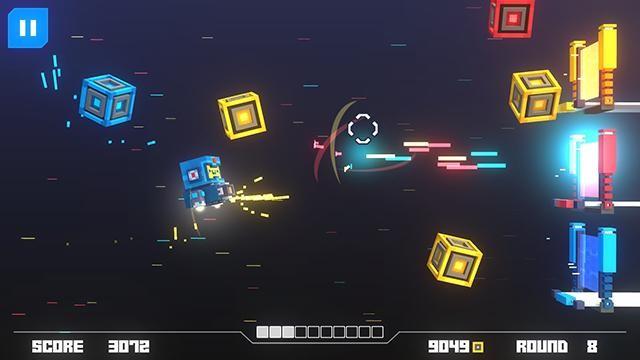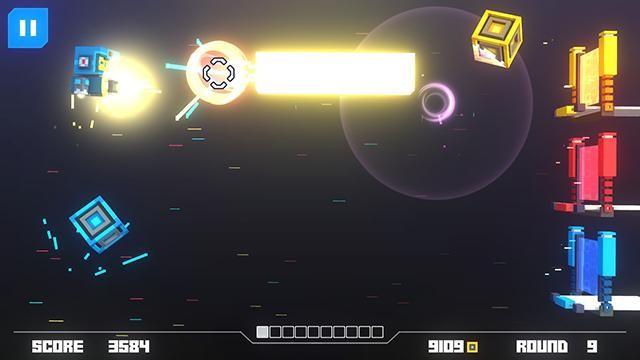‘BlamBox’ is a vibrant arcade game from solo Pinoy developer
“BlamBox” is one interesting indie game. Innovative and refreshingly unique, the game is a throwback to the golden age of arcade games, when players concerned themselves with chasing after the elusive high score instead of saving princesses or overthrowing galactic overlords.
And there's a lot of chasing that high score with “BlamBox.” Recently released on Steam, it is the first game from Heavenward Games, a Filipino development studio composed of a single person, A.J. Hecali.
Juggle box, shoot box
“BlamBox” puts you in the rocket boots of one of several polygonal space people. Your job is to shoot a bunch of boxes into three goals. Only it’s not that simple.
The boxes are constantly falling, so you’ll have to keep them up in the air by left-clicking on them. And you have to match the box and the goal with the same color.
Let a box fall or shoot it into the wrong goal, and you lose health points. When your health reaches zero, the game ends.
It starts off easy with only one box to deal with, but as the game progresses, you’ll be juggling up to four boxes at the same time.
It also helps that the game’s visuals, while lovely, are devoid of unnecessary details.
“The game relies on matching colors, so visual clarity is a top priority for me,” explained Hecali. “I opted to set the game in space so there’s not a lot of visual clutter that may distract the player. Plus, glowing lasers and photon barriers look really cool!”
The game’s core mechanic of juggling boxes and shooting them into goals was the result of experimentation.
“I just played around with the shooting mechanic in Unity. I experimented on shooting boxes through hoops, against other boxes, and through goals. My initial plan was to just let the player bounce the boxes into the goal, which was fun but got boring really fast,” said Hecali.
“Then I added a rocket power-up where you can shoot the boxes straight through the goals for a limited time, but you need to make sure that the box is at the right height before you shoot it. That power-up added so much fun and variation to the gameplay that I decided to make it permanent. Sometimes, you need to break your own game to make it fun.”
Hecali counts numerous games – including “Rocket League,” “Devil May Cry,” and older titles like “Hogan’s Alley” and “Pooyan” – among his sources of inspiration.

Realizing a dream
Hecali can trace his desire to develop video games back to when he was a child.
“The first time that I played ‘Super Mario Bros.’ at my Uncle’s house, it blew my five-year-old brain away! It was so fun to play that I was flailing my arms around while holding the NES controller, as if it was motion-controlled,” he said.
“That was when I started to dream about making video games.” In high school, he started to dabble in game development, making RPG Maker XP "to make an RPG where me and all of my friends are the characters!”
In college, he took up Computer Science to learn programming, and because no schools offered courses dedicated to game development back then, Hecali resorted to self-studying for his game-creation needs.
He learned GameMaker Studio, Blitz3D, and Unity, the engine he eventually used to create “BlamBox.”

A solo developer’s journey
“Being a solo developer is hard work!” Hecali said, rattling off all the tasks that come with being a one-man band: “design, art, code, and audio for the game, some marketing, Steamworks stuff, business related-tasks, and the daily responsibilities of being an adult."
But it does have its advantages. "The final product will be closer to your own vision of the game,” Hecali explained. “Also, when I think of a new feature, I just code it in. No need to explain it or to convince others that it’s worth trying.”
Hecali stated he probably wouldn’t have finished “BlamBox” within such a short time frame had he developed it with a team because “communication, conflicting schedules, and differing priorities take up a lot of development time.”
Despite the difficulties he encountered, Hecali found the experience rewarding. He was initially nervous about sharing his development progress with an online community, but the feedback he's received "was better than I could have expected! It made me a lot more confident about my game, and it gave a huge boost to my productivity.”
Hecali isn’t against working with a team; in fact, he’s eager to join one to work on bigger games.
“But on smaller games like ‘BlamBox,’ I’d probably do it alone just because it’s faster.”
Hecali has a message for Filipinos aspiring to develop their own games:
“Download Unity or Game Maker, then start making games right now. YouTube is filled with easy-to-follow game development tutorials that teach you how to make a game from start to finish. Focus on finishing the game, and don’t worry too much about the quality! You’ll learn a lot from the experience, and you’ll discover if game development is really right for you.”
Hecali added: “Have fun, good luck, and I look forward to playing the games that you create!” — LA, GMA News



